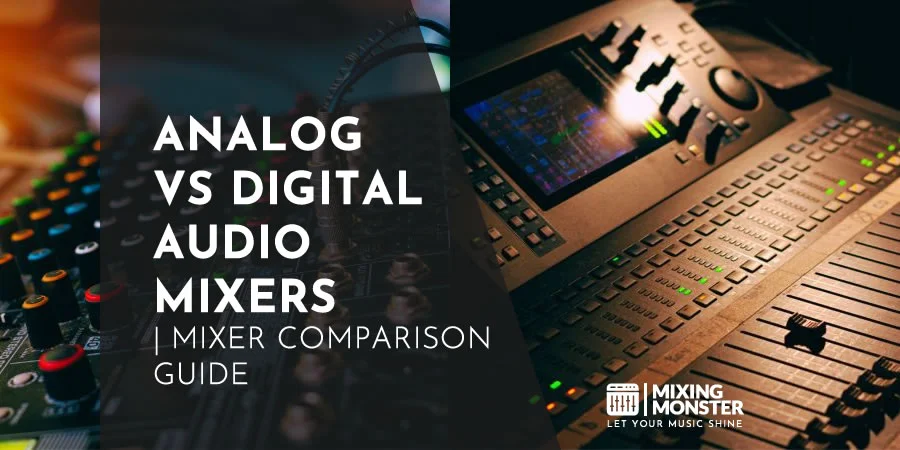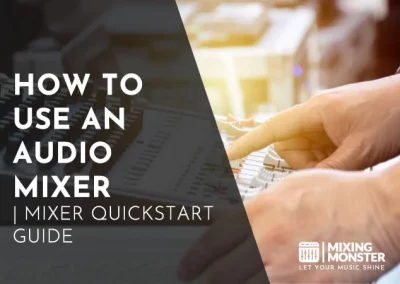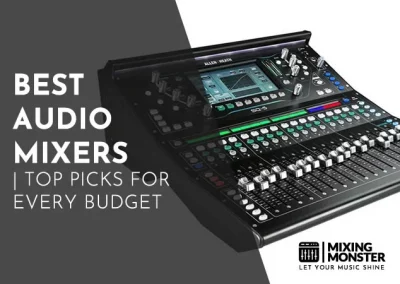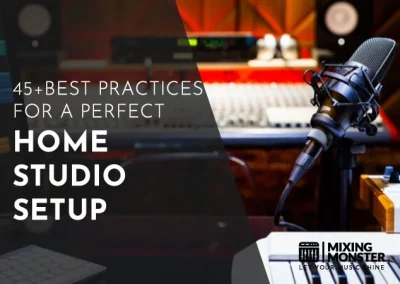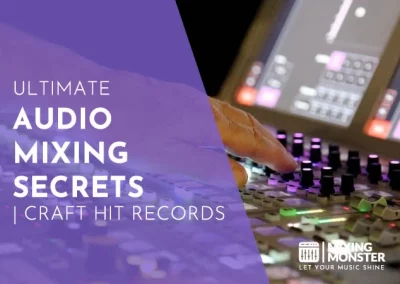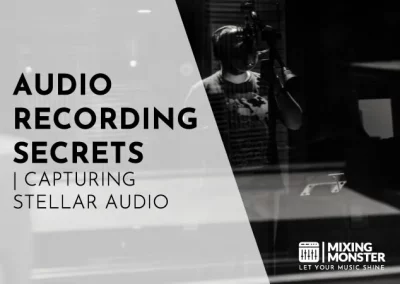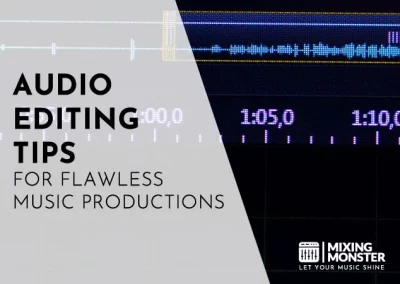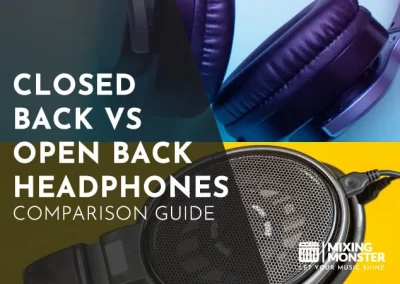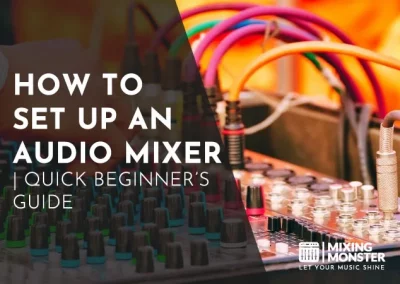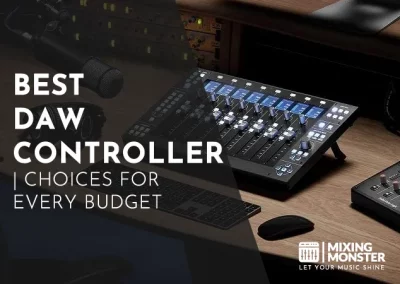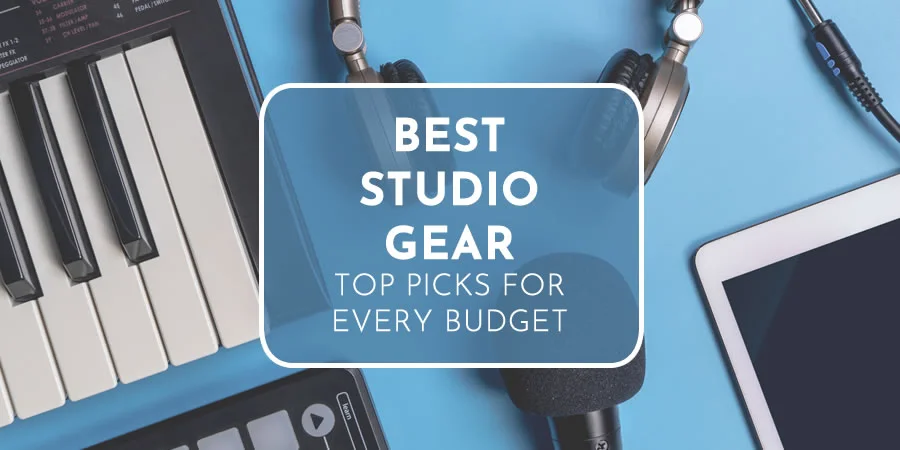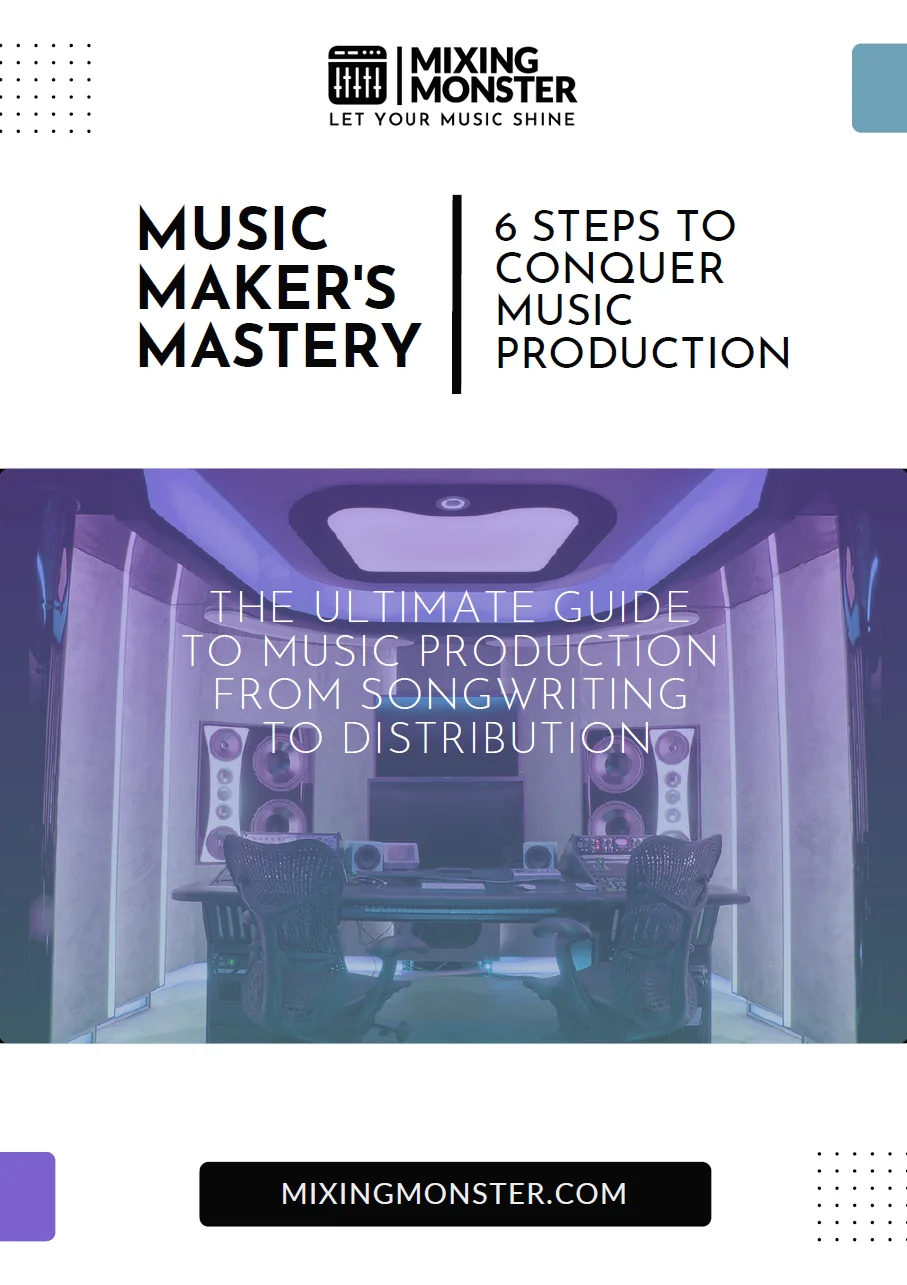Home > Blog > Studio Gear > Mixing Gear
Disclosure: Some of the links below are affiliate links, meaning that at no additional cost to you, we will receive a commission if you click through and make a purchase. Read our full affiliate disclosure here.
The debate over analog vs digital audio mixers continues in sound engineering and live performance. Choosing the correct type of mixer is crucial for achieving the desired audio quality and functionality.
Analog mixers have been the foundation of audio mixing for decades, offering a tactile experience with hands-on control and simple signal flow. They tend to be more affordable and are favored for their reliable performance and ease of use. On the other hand, digital mixers provide advanced features such as built-in effects, preset recall, and expanded routing options.
The choice between analog and digital can significantly impact the flexibility and quality of your sound. As you delve deeper into this article, you’ll uncover the nuances distinguishing analog mixers from their digital counterparts. We will guide you through the factors that influence mixer selection, helping you to discern the ideal mixer for different audio scenarios. Whether you’re setting up a home studio, managing live sound, or simply exploring audio mixing, understanding the pros and cons of each type will enrich your decision-making process.
KEY TAKEAWAYS:
- Knowing the differences between mixer types is essential for sound quality and functionality.
- Each mixer type offers unique benefits that are suitable for various audio environments.
- The right mixer choice depends on personal needs, budget, and technical requirements.
Table Of Contents
1. Overview Of Analog Vs Digital Audio Mixers
2. The Main Differences Between Analog And Digital Mixers
3. Benefits Of Analog Audio Mixers
4. Benefits Of Digital Audio Mixers
5. Disadvantages Of Analog And Digital Audio Mixers
6. Choosing The Right Audio Mixer For Different Scenarios
7. Audio Mixer Recommendations And Key Takeaways
8. FAQ

1. Overview Of Analog Vs Digital Audio Mixers
Before discussing specific types of mixers, you need to understand that audio mixers, often referred to as mixers, are the backbone of sound production and live performances. They allow multiple audio signals to be blended into a cohesive output.
What Is An Analog Audio Mixer?
An analog audio mixer, also known as an analog mixer, operates using physical knobs and faders to manage the sound channels. Each channel on these mixers typically has faders that control the volume and sometimes have knobs for adjusting settings like equalization and pan.
The signals in an analog mixer are kept in their original waveform throughout the mixing process, which some argue provides a ‘warmer’ tone.
What Is A Digital Audio Mixer?
In contrast, a digital audio mixer converts the audio signals into digital data, enabling more advanced processing. Digital mixers often have more features, such as the ability to save and recall settings, built-in effects, and sometimes even touch screens for navigation.
Channels can still be controlled using faders, but there’s generally a higher level of customization and control within digital mixers.
2. The Main Differences Between Analog And Digital Mixers
In the world of audio mixers, the choice between analog and digital options boils down to the intricacies of signal processing, quality of sound, and the range of features. Understanding these distinctions is crucial to making an informed decision.
Signal Processing And Workflow In Audio Mixers
Analog mixers are renowned for their straightforward, hands-on workflow. They offer immediate feedback and control over live audio signals. They process audio without converting it to a digital format, maintaining the signal’s purity.
Conversely, digital mixers leverage advanced digital signal processing, offering precision and the ability to save presets for quick recall. Your workflow is more versatile with digital mixers, which can be significantly more complex due to their layered interfaces and programmability.
Sound Quality And Fidelity In Audio Mixers
With analog mixers, the sound quality is often described as ‘warm,’ primarily due to the inherent characteristics of analog hardware. They typically offer limited channels and groups restricted by the physical circuitry.
In comparison, digital mixers may provide a cleaner sound and more channels in the same physical space, addressing the group limitations found in analog consoles thanks to their digital architecture.
Audio Mixer Flexibility And Features
Digital mixers shine because of their flexibility and extended features. They come with many built-in effects, automation capabilities, and the ability to control the mixer remotely.
Analog mixers, on the other hand, often require outboard gear to expand their functionality. They might be more suitable for you if you prefer the tactile experience and simplicity they offer, which can be ideal for smaller setups or specific live environments.
| Feature | Analog Mixers | Digital Mixers |
|---|---|---|
| Workflow | Intuitive, hands-on control | Complex, with recallable settings |
| Sound Quality | Warm, characteristic audio | Clean sound, more channels |
| Signal Processing | Direct signal path | Sophisticated digital signal processing |
| Flexibility | Requires additional hardware for more effects | Built-in effects, automation, and remote control |
| Physical Size | Often larger for similar features | Compact with more channels in less space |
| Ease of Use | Simple, immediate adjustment | Steeper learning curve, but highly configurable |
3. Benefits Of Analog Audio Mixers
Analog audio mixers are preferred for their ease of use and robustness, offering a tactile experience that digital mixers often cannot match.
Simplicity And Hands-On Control Of Analog Audio Mixers
When you interact with an analog mixer, you’re granted a hands-on experience that is both intuitive and immediate. The tactile knobs and faders allow for real-time adjustments, a boon for beginners and seasoned professionals alike who prefer a natural sound.
Each adjustment you make is direct and unbuffered by digital processing, ensuring the audio quality is warm and authentic. This simplicity in design means you can often start mixing immediately without navigating complex menus or software.
Reliability And Durability Of Analog Audio Mixers
Using an analog mixer means you’re working with a device known for being reliable. They are built to withstand the rigors of live performance and can often be repaired with standard electronics knowledge, making them a durable choice.
If a power surge or software malfunction occurs, an analog mixer is less likely to suffer a complete breakdown, allowing you to continue your work with minimal interruption. This reliability also extends to the audio performance, where analog mixers consistently deliver a natural, warm sound that artists and listeners value.
4. Benefits Of Digital Audio Mixers
Digital audio mixers bring a range of advantages to your audio production setup. They harness the power of digital technology to improve your sound manipulation capabilities with precision and recall features that analog mixers cannot match.
Advanced Routing And Flexibility Of Digital Audio Mixers
Digital audio mixers provide advanced routing options that allow you to easily send audio to different outputs and adjust signal paths with minimal effort.
This flexibility is a significant benefit in both live and studio settings, enabling you to tailor the audio routing to the specific demands of each project. For instance, digital mixers offer more channels in a smaller space, a handy feature for setups with limited room.
Built-In Effects And Processing Power Of Digital Audio Mixers
One of the standout features of digital audio mixers is their built-in effects and robust processing power. Unlike analog mixers, which often require outboard gear for effects, digital mixers come equipped with a wide array of effects, such as reverb, delay, and EQ, right out of the box.
Additionally, digital mixers’ processing power allows for more complex effects and signal processing without the need for external hardware. Their automated features enhance your control during live performances and recording sessions, offering a level of convenience that elevates your audio mixing capabilities.
Digital Precision And Preset Saving In Digital Audio Mixers
The precise control over audio parameters is a defining characteristic of digital audio mixers, which is important for achieving your desired sound. The digital precision ensures consistency and accuracy that is difficult to replicate with analog controls.
Additionally, saving and recalling presets is a game-changer, allowing you to quickly set up for a session or switch between different scenes during a live performance with a few button presses.
This aspect of automation and recallability dramatically contributes to the overall efficiency of the mixing process, making digital mixers a valuable tool for engineers and artists alike.

5. Disadvantages Of Analog And Digital Audio Mixers
While analog and digital mixers boast advantages, you’ll also encounter specific drawbacks. Understanding these limitations and challenges can influence your decision-making process in audio mixing.
Limitations Of Analog Audio Mixers
Analog mixers, although valued for their warmth and ease of use, face certain drawbacks. They tend to be bulky, occupying more physical space and significantly hindering smaller studios or live settings.
Additionally, analog mixers often need help with noise issues; with proper grounding or shielding, they can introduce unwanted hiss or hum into the audio path. The process of eliminating this distortion can often require considerable effort and equipment.
Challenges With Digital Audio Mixers
Digital audio mixers, on the other hand, present a different set of challenges. Their complexity can be confusing, especially for beginners, due to the multitude of options and settings available.
Navigating the digital interface and adjusting multiple channels can be daunting and time-consuming.
Furthermore, while higher quality and customization are hallmarks of digital mixers, these benefits come at a cost: they are typically more expensive than their analog counterparts.
6. Choosing The Right Audio Mixer For Different Scenarios
When selecting an audio mixer, it’s essential to consider the specific environment and application. This section guides you in identifying the most appropriate mixer for live performances, studio recordings, and mobile setups based on practical needs.
Audio Mixers For Live Sound And Performance Venues
Robustness and versatility are key for live sound and performance venues. Analog mixers are often favored for their straightforward functionality and tactile feedback, which can be crucial in a live scenario.
They provide immediate control over sound, with physical knobs and faders that allow for quick adjustments. For larger venues or more complex performances, digital mixers bring added benefits such as saving and recalling presets, more sophisticated routing options, and built-in effects.
They can be more expensive, necessitating a balance between budget considerations and the functionalities required for your live performance.
Audio Mixers For Recording Studios And Home Studio Setups
Audio quality and integration with digital audio workstations (DAWs) become paramount in a recording studio or home studio environment.
Digital mixers excel here with superior audio quality and flexibility for integrating various software and plug-ins. They also allow for complex routing and multi-track recording, essential for studio work.
However, some may prefer the distinct sound that analog mixers provide, often described as “warm.” Ultimately, the choice may depend on your preference and whether you value the tangible nature of analog mixers or the customizable digital environment.
Portable Audio Mixers And Field Recording
For field recording and situations where portability is crucial, portable audio mixers offer a compact solution. When choosing one, consider weight and Size, as well as battery life for extended use on location.
Durability is also a factor, as field recording often occurs in demanding environments. While most portable mixers are analog, providing straightforward control with less power consumption, compact digital models offer advanced features such as multi-track recording and wireless connectivity.
Your choice in this scenario should align with the demands of portable and field recording situations—whether you need something lightweight with a simple setup or a mixer with advanced capabilities for a complex field project.
7. Audio Mixer Recommendations And Key Takeaways
Before diving into specifics, remember that choosing between analog and digital mixers hinges on balancing cost, sound development needs, and the level of customization you require.
Top Analog And Digital Mixers
Analog Mixers:
- Affordable Option:
The Yamaha MG Series provides a range of affordable options without sacrificing quality, making it a solid choice if you’re on a budget. - Premium Choice:
The Allen & Heath ZED series is expensive but unrivaled in audio fidelity, offering a top-tier analog experience with exceptional sound warmth.
Digital Mixers:
- Budget-Friendly:
Behringer’s X AIR series is a cost-effective entry point into digital mixing, offering extensive control features for a modest investment. - High-End Customization:
The Presonus StudioLive series stands out for sound development and versatility, but be prepared for a steeper learning curve and higher price tag.
Final Thoughts On Making Your Audio Mixer Choice
Your decision should align with your needs and proficiency. Analog mixers are typically more beginner-friendly, whereas digital mixers provide more customizable options and can often serve as both a mixer and audio interface.
Weighing the convenience of integrated hardware with potential cost implications is crucial. Remember that an expensive mixer usually comes with many features that could be paramount for advanced sound development. Still, an affordable mixer might meet your necessities without complication.
8. FAQ
1) What are the critical differences in sound quality between analog and digital mixers?
Analog mixers are known for their warm sound due to the natural harmonic distortion they introduce, which some people find desirable for their “vintage” character. Digital mixers, however, offer pristine audio clarity and precision, often preferred for their accuracy in sound reproduction.
2) How do the functionalities compare between analog and digital mixing consoles?
Functionality-wise, digital mixers provide a wider array of options, including the ability to save and recall settings instantly. They typically offer built-in effects and can often be easily integrated with digital audio workstations. In contrast, analog mixers have a more hands-on approach and straightforward design but may require external equipment for effects and advanced routing.
3) What are the pros and cons of using an analog mixer with built-in compressors for live sound?
Using an analog mixer with built-in compressors offers direct control over dynamics without needing additional rack units. The hands-on tweaking is intuitive for many engineers. The downside is that analog compressors can vary in consistency and may need more precision and recall capabilities than their digital counterparts.
4) In what scenarios are digital mixers considered more advantageous than their analog counterparts?
Digital mixers are often more suitable for complex setups requiring multiple channels, automation, and advanced processing. They excel in environments where the ability to switch between scenes quickly is necessary, such as theater productions or multi-band festivals.
5) Are there unique disadvantages to digital mixers that one should be aware of?
The complexity of digital mixers can present a steep learning curve, potentially leading to confusion during live events. Furthermore, they are typically more expensive initially, and their reliance on software means that they may be prone to bugs or crashes.
6) How might the choice between an analog and a digital mixer affect a church's audio setup?
For churches, selecting an analog mixer may offer simplicity and ease of use for volunteers or staff with limited technical expertise. However, a digital mixer can be a worthwhile investment for congregations looking for versatile audio routing options, the ability to save and recall settings, and remote mixing capabilities.

